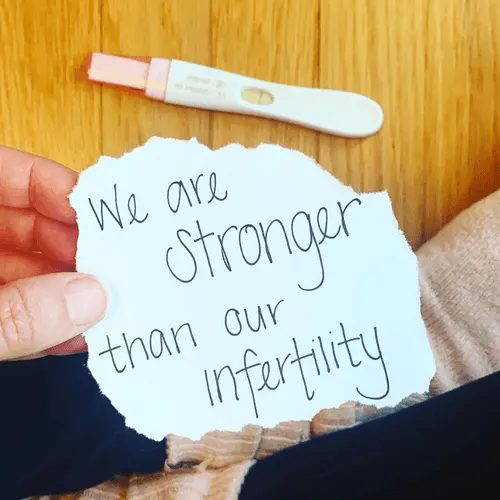In recognition of National Infertility Awareness Week, we’re sharing key takeaways from a heartfelt conversation between Sarah, founder of Poppylist, and Leila Bilali, RN and co-founder of Dandi Fertility.
National Infertility Awareness Week is a moment to reflect, learn, and support those on a fertility journey. In a recent webinar, Sarah and Leila explored everything from proactive care to emotional allyship. Whether you’re trying to conceive or supporting someone who is, here are the biggest takeaways.
8 Key Takeaways from Our Webinar
1. Normal Doesn’t Mean Immediate: Understanding Fertility Timelines
One of the biggest takeaways from the conversation is that fertility doesn’t follow a predictable or universal timeline. While it’s completely normal for conception to take time—even up to a year for healthy individuals under 35—age can shift that timeline. For those 35 and older, the general recommendation is to try for six months before reaching out to a fertility specialist. That said, it’s always okay to ask questions or seek support sooner if something doesn’t feel right. Speaking with your OB/GYN early on can offer clarity and peace of mind. Normalizing these differences helps relieve the pressure to follow an “ideal” timeline and encourages individuals to trust their own pace and seek support when it feels right.
2. Understand the Full Picture of Fertility Health
Fertility health isn’t always reflected in how you feel or look physically. While tracking your menstrual cycle can offer key insights—especially after stopping birth control—other factors like thyroid imbalances, past surgeries, or undiagnosed infections can also play a role. Since many of these issues won’t show up during a typical physical exam, seeking care that focuses specifically on reproductive health empowers you to identify concerns early and take informed steps on your path to parenthood.
3. Debunking Fertility Myths: What’s Fact vs. Fiction
Fertility can be clouded by misinformation, making it hard to separate fact from fiction. A common myth is that birth control causes infertility, when in reality it doesn’t—but it can mask underlying issues that only emerge once you stop taking it. Another misconception is that regular periods equal guaranteed fertility, though factors like egg quality, hormone levels, or uterine health also play a role. And while internet remedies like taking Robitussin or Mucinex for cervical mucus circulate widely, they aren’t backed by science and can be misleading. Understanding the truth behind these myths can help you make informed, confident decisions about your reproductive health.
4. Navigating the Digital Supplement Aisle
In the age of wellness marketing, fertility supplements can feel like a tempting shortcut—but they’re not one-size-fits-all. The supplement aisle (or Instagram ad feed) is overflowing with products promising to “boost fertility,” yet not all of them are necessary—or even helpful—for your unique situation. Starting with a fertility consultation gives you a clear baseline and can prevent you from investing in supplements that may not align with your needs. It’s a more intentional approach that prioritizes your individual biology over trial-and-error solutions.
5. Diet & Lifestyle Matter—for Everyone
There’s no one-size-fits-all fertility diet, but many experts recommend a Mediterranean-style approach—rich in healthy fats, lean proteins, and low in refined carbs—to support reproductive health. Restrictive diets like gluten-free or dairy-free should only be followed if medically necessary, as the stress of strict eating can sometimes do more harm than good. Being underweight or overweight can disrupt ovulation and may contribute to conditions like PCOS. Supporting your overall health with balanced nutrition, regular movement, and stress management can benefit anyone on the fertility journey.
Male fertility plays a crucial role too, and the burden to conceive shouldn’t fall entirely on women. Lifestyle choices like smoking, marijuana use, and hot tubs can affect sperm quality—but the good news is, these effects are often reversible with healthier habits. An early semen analysis can provide valuable insights and is an important part of a balanced, informed fertility journey.
6. Choose the Right Fertility Specialist for You
Finding a fertility specialist can feel overwhelming, but knowing what matters most to you can help narrow the search. While success rates and clinical outcomes are important—and tools like SART.org can help compare them—your experience also hinges on emotional support, communication style, and how well a clinic fits your insurance plan. Some people prioritize data-driven care, while others place more value on a provider with a bedside manner that supports their emotional needs. Resources like Fertility IQ offer real patient reviews to help you get a fuller picture of the care team—not just the doctor, but the whole experience.
7. Support Without Pressure Is Powerful
Emotional support can be one of the most meaningful gifts during a fertility journey. You don’t need to have the right words or offer solutions—just showing up matters. A simple message like, “I’m thinking of you—no need to respond,” can bring comfort without pressure. Avoiding unsolicited advice and creating space for someone to share (or not) helps reinforce that they’re not alone. Compassion, patience, and presence go a long way.
Find the full conversation here to learn more about how fertility specialists can provide the personalized, medically credible support you need to make informed decisions early in your journey. You can also explore our article about 3 reasons to be proactive about your fertility for more on why timing and education matter. As we continue to bring these insights to light, National Infertility Awareness Week offers a meaningful moment to take that awareness further—through action, empathy, and support.
Whether you’re directly impacted or standing in solidarity here are a few ways to honor National Infertility Awareness week. Start by opening up conversations—sharing your own story or simply letting others know they’re not alone can help break the silence. If someone close to you is navigating infertility, reach out with a thoughtful message and offer support without pressure. You can also spread awareness by sharing educational resources, wearing orange on Wednesday to spark conversation, or advocating for more inclusive and accessible fertility care. Even small actions—like donating to organizations such as RESOLVE or amplifying stories on social media—can create ripple effects of compassion and change. However you choose to show up, your empathy makes a difference.


